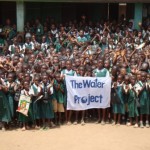This project was implemented by another partner, but is now monitored and maintained by The Water Project together with Mariatu's Hope.
A Sierra Leone team member commented on, "Seeing so many little children with big bellies that were more than likely filled with worms was very striking. This is the only well in the community and the need is great."
When the team arrived, community members were utilizing an unprotected spring located two kilometers away from the community to meet all of their water needs. Because of this and the community’s use of a covered pit latrine, families were suffering from cholera, dysentery, typhoid, malaria and respiratory illnesses. During the team's stay, community members assisted the team with the water project whenever possible, made food for the team, provided any materials they had available and provided security over the water project during the night. Most community members sustain their families by petty trading, working as teachers, priests, for the local government and by working other odd labor jobs for daily wages. There is a primary school located in the community with 571 students all who now have access to a clean water source and latrine. Before leaving the community, the team provided community member, Mrs. Elizabeth Massaquoi, with a contact number in case their well were to fall into disrepair, become subject to vandalism or theft.
(Editor's Note: While this many people may have access on any given day, realistically a single water source can only support a population of 350-500 people. This community would be a good candidate for a second project in the future so adequate water is available. To learn more, click here.)
The Sierra Leone team had an opportunity to meet with thirty-seven year old community member and senior teacher at Holy Cross Primary School, Fatmata Kamara, who stated, "We feel really good about the well being made in good condition and about the new toilets. We really appreciate all you have done for us. The toilets are wonderful. We will make sure they are used properly and maintained."
During the hygiene education, the Sierra Leone team addresses: Hand washing, how to properly transport and store water, disease transmission and prevention, how to maintain proper care of the pump, as well as signs and symptoms of dehydration and how to make Oral Rehydration Solution. All of these lessons are taught in a participatory method to help community members discover ways to improve their hygiene and sanitation choices, and implement community driven solutions. After the hygiene education, the community constructed a fence around the well site to help keep livestock and wild animals away from their clean water source.
 WAsH for Schools
WAsH for Schools Rehabilitation Project
Rehabilitation Project












